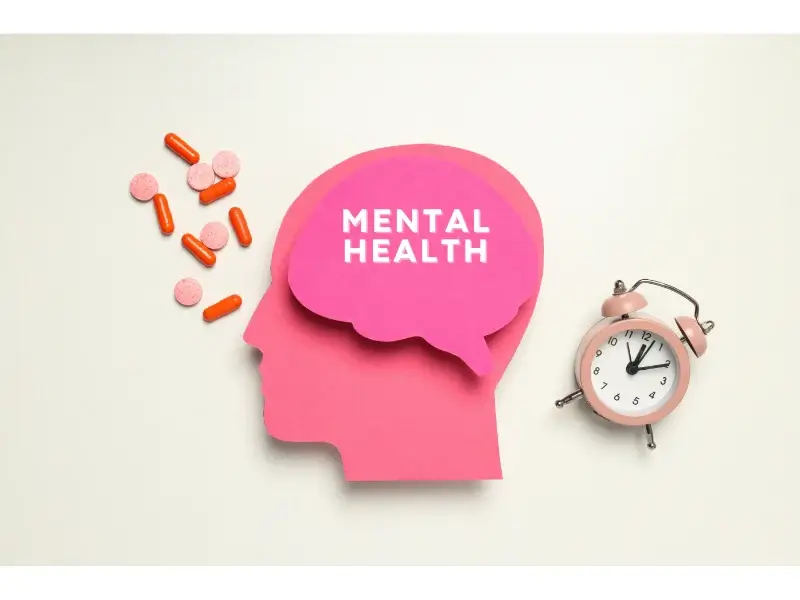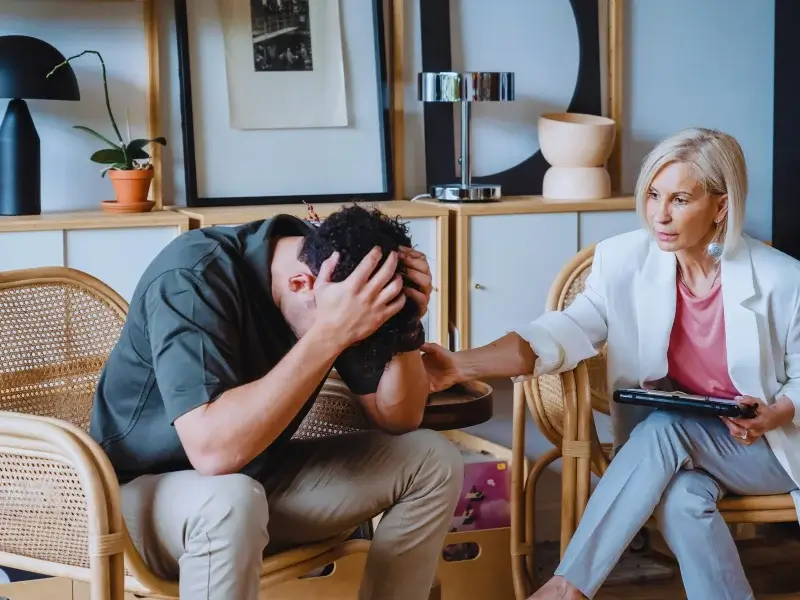
About 1 in 3 adults in the U.S. have trouble sleeping, and it’s even more common if you’re dealing with anxiety, depression, or other mental health struggles.
If you’ve ever been to a psychiatrist and they asked about your bedtime habits, it might’ve felt like an odd question at first.
But there’s a good reason for it. Sleep problems and mental health are deeply connected.
If you’re not getting enough sleep, it can seriously affect your concentration, emotional balance, and ability to manage stress.
Getting better sleep plays a big role in how you feel day to day, and at CNS Center Arizona, we understand how closely it’s tied to your mental health.
Understanding Sleep Patterns and Their Impact on Mental Health
Why Regular Sleep Patterns Matter
Keeping a steady sleep schedule helps your body know when it’s time to rest and when it’s time to be alert.
When that schedule shifts often, like staying up late on weekends or napping during the day, it can confuse your internal clock.
That confusion makes it harder to fall asleep or stay asleep when you need to.
This kind of sleep disruption can increase stress and worsen mood problems.
When you get used to going to bed and waking up around the same time, your body and brain respond better.
You feel more rested, focused, and emotionally balanced.
That’s why psychiatrists pay close attention to how consistent your sleep routine is.
How REM Sleep and Mental Health Are Connected
REM sleep is one of the deeper stages of sleep where your brain is very active and when dreams happen.
It’s not just about dreaming, though.
REM sleep plays a key role in sorting through emotions and helping your brain recover from daily stress.
When people don’t get enough REM sleep, they’re more likely to feel emotionally overwhelmed or moody the next day.
Some studies even show that skipping REM sleep can increase your risk for anxiety and depression.
That’s why treating mental health conditions often includes figuring out how to protect and improve REM sleep.
How Sleep Problems Show Up in Mental Health Conditions
What Sleep Disruptions and Anxiety Look Like
People who struggle with anxiety often have trouble sleeping.
They might lie awake with racing thoughts or wake up feeling panicked.
And when you’re not sleeping well, it makes the anxiety feel worse during the day.
It becomes a loop. As poor sleep increases anxiety, anxiety makes it harder to sleep.
Our psychiatrists at CNS Center Arizona look for this pattern because breaking it can bring real relief.
Therapies like CBT for insomnia or relaxation exercises before bed can reduce anxiety and improve sleep at the same time.
How Sleep Issues Affect People With Depression

Depression can either keep people awake at night or make them sleep far more than usual.
It depends on the person. But no matter the direction, the sleep changes usually make symptoms worse.
Poor sleep can make you feel more hopeless, tired, and disconnected.
Helping someone with depression sleep better is often part of the treatment plan.
May it be through building better habits or using medication, improving sleep is part of how we help people recover emotionally.
Why Psychiatrists Ask About Your Bedtime Routine
What Bedtime Routines Reveal About Mental Health
Your bedtime habits give psychiatrists a lot of information.
When someone avoids going to bed, sleeps at odd hours, or can’t unwind at night, it can point to deeper mental health struggles.
These behaviors are more than just quirks, and are often tied to mood and thought patterns.
In asking about bedtime routines, psychiatrists can understand what’s helping or hurting your mental state.
It’s a simple way to spot red flags early and plan care that fits your lifestyle.
How Bedtime Routines Help With Treatment
A bedtime routine is like a signal to your brain that it’s time to relax and sleep.
Things like dimming lights, putting away your phone, or reading a book at the same time each night can make a big difference.
These small actions add up and can actually help calm an overactive mind.
CNS Center Arizona helps people build routines that match their mental health needs.
Better sleep can be achieved by finding habits that work for you and support your healing.
The Role of Sleep Hygiene in Mental Health Care
What Is Sleep Hygiene?
Sleep hygiene means having healthy habits that help you sleep well.
That includes things like going to bed at the same time, avoiding caffeine in the evening, and limiting screen time before bed.
It’s one of the first things psychiatrists will check if someone is struggling with sleep or mood issues.
Poor sleep hygiene is really common.
Even people without mental health conditions can feel the effects of things like staying up late on their phone.
For those already dealing with anxiety or depression, it makes symptoms worse.
How Sleep Hygiene Helps With Mental Health Recovery

When your sleep improves, your energy, focus, and emotional stability tend to improve too.
That’s why treating sleep problems is often a part of mental health recovery.
People who stick to good sleep habits usually respond better to therapy and feel more in control of their emotions.
Which is why sleep hygiene is something CNS Center Arizona talks about with many of our clients.
We help people make simple changes that can have a big impact on their recovery and daily life.
Sleep and Medication: What to Know
How Psychiatric Medications Affect Sleep
Some medications used to treat depression, anxiety, or other conditions can make you sleepy, while others can keep you up.
It’s important for psychiatrists to know how your body reacts to medication when it comes to sleep.
If you’re not sleeping well on a new medication, it might not be the right fit.
That’s why talking about your sleep patterns isn’t just helpful but essential in therapy.
It helps your psychiatrist adjust your treatment in a way that supports your mental and physical health.
When Medication Might Help Sleep Issues
For some people, therapy and routines aren’t enough.
In those cases, a short-term sleep aid or medication to help regulate mood and sleep might be part of the plan.
But medication is usually a last resort after other strategies are tried.
CNS Center Arizona works with each person to find the safest and most effective approach.
Sometimes medication is a helpful bridge toward better sleep and mental health.
What You Can Do if You’re Struggling With Sleep and Mental Health
Talk to a Professional
If your sleep problems are affecting your mood, memory, or daily life, it’s worth talking to someone about it.
You don’t have to wait until it gets severe. Psychiatrists can help uncover whether sleep is part of the issue and what can be done about it.
Even tracking your sleep patterns for a few weeks can give your provider valuable insight.
Small Changes That Can Help Right Away
You don’t need to overhaul your entire lifestyle to start feeling better.
Try going to bed and waking up at the same time each day, keeping your bedroom cool and dark, and avoiding screens an hour before bed.
These simple steps often lead to better rest.
If you’re in Arizona, CNS Center Arizona is here to help.
We know the difficulties of having sleep disruptions and anxiety go together, and we’re here to help people of all ages find relief.
Start Sleeping Better With Support From CNS Center Arizona
Psychiatrists ask about your bedtime routine and sleep patterns because sleep is a key piece of your mental health.
From REM sleep and mental health connections to how sleep disruptions and anxiety feed into each other, sleep plays a bigger role than many people realize.
If you’ve been struggling with sleep problems, there’s a good chance your emotional health is being affected too.
Which is why CNS Center Arizona takes a close look at sleep when we’re helping clients find the right care plan.
We believe that better sleep can lead to better mental health, and we’re here to support you through that process.
If you’re ready to talk, call us now.
We’re here to listen, not to judge, and we’ll work with you to find solutions that make sense for your life.





